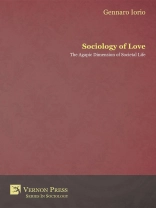This short book deals with a sociological concept: love-agape. It is an attempt to demonstrate that love-agape resists, indeed insists, as a fact that cannot be reduced or concealed. Its simple goal is to introduce agape into the vocabulary of sociological analysis by demonstrating its potential to demarcate and to interpret social phenomena. Love-agape is presented as a critical concept. On the one hand, love-agape denounces the risks linked to the needs of closed groups, often absolutist and fundamentalist. On the other hand, it represents a concrete reality, lying at the root of a particular type of sociality. A sociality that, rather unconventionally, recognizes differences and distances, but also characterizes their condition of being together, as community founded on the recognition and respect of subjectivity.
Tabela de Conteúdo
1. What is Agape
1.1. The rediscovery of love
1.2. Which research method
1.3. The concept of agape
1.3.1. The states of peace by Boltanski
1.3.2. A critical note
1.4. Definition of agape
1.5. The five dimensions of agape
1.6. Six agapic propositions
1.7. Conclusion
2. What agape is not:
2.1. Eros
2.2. Philia
2.3. Gift
2.4. Conclusion
3. Love in the sociological tradition
3.1. Simmel
3.2. Weber
3.3. Sorokin
3.4. Conclusion
4. Agape: the micro and the macro
4.1. The subject and his/her identity
4.2. In the historical-comparative evolution of the West
4.3. Conclusion
5. Case studies
5.1. Perlasca
5.2. Peer to Peer
5.3. Divjak: political resistance
5.4. Conclusion
6. Epilogue
Sobre o autor
Gennaro Iorio, Ph D., is Associate Professor of Sociology at the University of Salerno. He has published a number of works on classical sociology, sociology of poverty and sociology of new technology. He teaches sociology in postgraduate, masters and doctoral courses.












